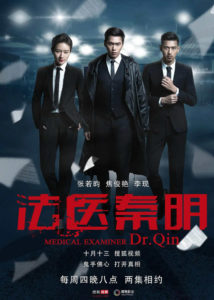Under the Microscope Episode 4 Recap
> Under the Microscope Recap
After Prefect Huang concluded his other official duties, he inquired about Assistant Magistrate Ren's health. Ren thanked the Prefect, who confirmed he had found a good physician in the city for him and invited him to join the ongoing discussion about the Silk Poll Tax. Prefect Huang noted that all the county magistrates were busy and urged everyone to conclude the meeting swiftly.
Prefect Huang then raised Shuai Jiamo's request from the previous day to open the Archives in all eight Jin'an counties for a thorough investigation. Magistrate Mao vehemently opposed this, arguing that Shuai Jiamo was merely a commoner, and granting his request would undermine the government's authority. He also worried about potential chaos if others followed Shuai Jiamo's lead. Prefect Huang sharply rebuked Magistrate Mao for "making a scene," emphasizing that this was a matter Jin'an Prefecture itself needed to resolve.
He stated that the Silk Poll Tax, having been in place for over a century, could not be justly adjusted without a complete examination of the original records in the Archives. Another magistrate brought up a past incident in Nanjing where a father and son were sentenced to strangulation for tampering with yellow registers, highlighting the seriousness of Archives access.
Magistrate Mao then turned on Magistrate Fang, questioning why he had only given Shuai Jiamo a flogging for trespassing into the Archives, implying a disregard for national records. Magistrate Fang defended himself, claiming he hadn't anticipated Shuai Jiamo would cause such an uproar, though he had subsequently prohibited him from re-entering the Archives. Prefect Huang attempted to redirect the conversation back to the tax, but the magistrates insisted Shuai Jiamo harbored ill intentions.
They questioned his motives, pointing out that as an orphan and bachelor, he stood to gain nothing personally from challenging the tax, and thus must be acting under someone else's instruction. They demanded Shuai Jiamo clarify his true purpose, threatening him with severe punishment, akin to the Nanjing case, if he failed to do so. Prefect Huang, growing weary, finally prompted Shuai Jiamo to explain why he had entered the Archives.
Shuai Jiamo stated that while helping villagers measure land, he discovered discrepancies between his measurements and the fish-scale map registers. Driven by his discomfort with numerical anomalies, he went to the Archives to investigate. He began by reviewing the fish-scale map registers, which led him to the tax registers. He explained that the numbers were interconnected, and "one movement changes everything." Following this trail, he uncovered problems with the Silk Poll Tax.
The magistrates dismissed his explanation as "nonsense," but Shuai Jiamo earnestly insisted on his seriousness. One of the magistrates then called upon Cheng Renqing, who introduced himself as a student from Lanxi County. When asked how he knew Shuai Jiamo's motives, Cheng Renqing offered a philosophical reply about common sense and justice. Despite Assistant Prefect Song's attempt to interject, Prefect Huang allowed Cheng Renqing to continue.
Cheng Renqing then recounted a tragedy from 20 years prior, in the 38th year of the Jiajing reign, when a house fire in Renhua County claimed the lives of a couple, Shuai Duncheng and Liu Yue'e, leaving behind an orphan. He revealed that Shuai Duncheng was a highly skilled copyist in the Renhua County Revenue Office. Cheng Renqing linked this to a massive corruption case in Jin'an Prefecture, which had alerted the Grand Coordinator and Regional Inspector.
The investigation, he claimed, pinpointed Shuai Duncheng as a culprit who had embezzled 3,530 taels from the Silk Poll Tax. The fire, he suggested, was a self-immolation to escape justice. Cheng Renqing then directly implied that the orphaned child, Shuai Jiamo, was now seeking revenge for his parents.
Assistant Magistrate Ren confirmed the general facts of the tragedy but also noted that the sum involved seemed too large for Shuai Duncheng to have embezzled alone, suggesting the case had lingering doubts. Cheng Renqing conceded that while the old case might have had suspicious elements insufficient to overturn the original verdict, it was certainly enough to plant seeds of hatred in a child's heart. Overwhelmed, Shuai Jiamo collapsed, recalling a blurry image of his father holding a book.
Feng Baoyu quickly took him to a back room, where a physician diagnosed him with repressed emotions that he was unable to vent and prescribed sour date water and rest. Upon regaining consciousness, Shuai Jiamo was still fixated on investigating the Silk Poll Tax, but Feng Baoyu informed him that the focus of the discussion had shifted from the tax to Shuai Jiamo's identity and past.
Meanwhile, back in the main hall, Prefect Huang grew suspicious of the magistrates' concerted efforts to condemn Shuai Jiamo, wondering if there was indeed a hidden truth about the Silk Poll Tax. Assistant Magistrate Ren presented his worn and mended boots, explaining his personal frugality and the dire poverty in Wancheng, a region primarily composed of mountains and water.
He detailed how the burden of regular taxes, apportioned corvée, and various miscellaneous corvée work left peasant families with barely enough to survive, often less than half a tael of silver profit annually, insufficient even for seeds the following year.
He warned Prefect Huang about the severe consequences of imposing any new taxes, predicting that farmers would be forced to sell their assets, fall into debt, abandon their land, become tenants, flee, or even resort to violence against officials and become bandits. He stated that for the sake of his people, he could not support the tax, whether it was real or not.
The Lanxi County magistrate echoed these concerns, threatening to resign if disputes over new taxes delayed the delivery of main taxes to the court. Another magistrate added that the tax was over a hundred years old and had become an established custom, arguing that pursuing it meticulously would open a Pandora's box of endless controversies. Seeing their united front and realizing his limited power to act, Prefect Huang closed his eyes in contemplation before delivering his verdict.
He formally declared that Shuai Jiamo was being detained for spreading false rumors and inciting unrest, driven by personal revenge. He ordered Shuai Jiamo to be handed over to the Office of Justice for sentencing and warned the people of Renhua against discussing the matter further or spreading rumors, threatening accountability for any offenders. Unaware of the full proceedings, Feng Biyu, in her shop, believed her brother and Shuai Jiamo had won.
Cheng Renqing approached her with feigned congratulations, then gleefully revealed that her brother had lost the lawsuit and Shuai Jiamo was in dire straits, having been reported for acting out of personal vengeance. He thanked Feng Biyu for inadvertently providing him with information about Shuai Jiamo's family background, which allowed him to uncover this secret.
Cheng Renqing then warned her about the dangers of meddling in tax and grain affairs, which were the "lifeblood" of officials and the court, saying such interference was a path to doom. When Feng Biyu retorted that he was the one seeking doom, he countered with a second warning: "Interfering with someone making their fortune is akin to killing their parents," the gravest form of enmity.
He then threatened her businesses, hinting at inspections for diseased pork or financial irregularities, and suggested she might be commanded to supply 3,000 jin of premium ham hocks to the capital for free. He concluded by asking if she wished to save her "playboy brother."
Cheng Renqing then presented a pre-written confession for Feng Baoyu, asserting that he had been deceived by an evil person, couldn't discern truth from falsehood, and only filed the joint plaint out of obligation to a friend. The confession ended by stating Feng Baoyu now repented and was willing to testify that Shuai Jiamo was indeed acting out of personal revenge and deceiving the public.
As Cheng Renqing was being carried away in his sedan chair, Feng Baoyu knelt before him, pleading for justice for Shuai Jiamo and a way to secure his release. Cheng Renqing, dismissive, stated that "justice comes at a price" and mocked Shuai Jiamo as a mere "arithmetic nut" who wouldn't survive exile. He cynically suggested Feng Baoyu could tear up the confession, turn himself in, and claim he was the mastermind behind everything, thereby freeing Shuai Jiamo.
Instead, Feng Baoyu defiantly tore up the confession document, declaring that Shuai Jiamo's sentence ultimately rested with Prefect Huang, and he departed with a new plan to rescue his friend. Inside the prison, Shuai Jiamo's peculiar behavior at night—muttering to himself and drawing sigils—unnerved the other inmates. They clamored for the guards, claiming they had seen black smoke and that Shuai Jiamo was possessed, demanding to be moved and offering to confess their own crimes.
By morning, rumors of a "cat spirit" possessing Shuai Jiamo circulated throughout the prison. Feng Baoyu arrived to visit Shuai Jiamo, presenting an official document that granted him access. He asked the guards to tell Shuai Jiamo not to "do hoodoo" in their prison. Inside his cell, Shuai Jiamo, unfazed by his surroundings, was still engrossed in his calculations.
He excitedly told Feng Baoyu he had devised a new method to prove the link between the Silk Poll Tax and the provisions supplement, needing only the original registers. Feng Baoyu, however, pressed him on Cheng Renqing's story, asking if he was indeed using the tax case to avenge his parents. Shuai Jiamo denied it, explaining that he remembered nothing of his parents' death, only a jumbled mess of fragmented memories, making it impossible to distinguish truth from falsehood.
He confirmed that arithmetic remained his sole passion, a legacy from his father. He articulated his philosophy: numbers are inherently honest and simple, their relationships immutable, unlike unpredictable human hearts. He described arithmetic as his "path," a source of immense joy where he could "wander up into the heavens and down into the netherworld," comparing it to becoming an Immortal. Feng Baoyu, though not fully grasping the intricacies of Shuai Jiamo's mathematical passion, promised to return.
Later, Feng Baoyu explained his rescue strategy to Feng Biyu. He reasoned that Prefect Huang's decision to hand Shuai Jiamo's sentencing to the Office of Justice was a subtle hint that he wished to avoid direct involvement. Feng Baoyu's plan was to propose a highly exaggerated and absurd sentence for Shuai Jiamo to the Office of Justice, such as flogging 40 times and exile 3,000 li away.
This extreme proposal would be easily overruled by Prefect Huang, thus acquitting Shuai Jiamo without overtly challenging the other magistrates' united opposition. In the public square, the local magistrates posted proclamations, declaring Shuai Jiamo a "scoundrel" for spreading falsehoods about the taxes and stirring up trouble, assuring the public that the "criminal has been detained" and "all is well."
The Renhua county magistrate, Magistrate Fang, also posted a notice claiming he had "caught a cold" and was postponing all official matters. As predicted, the Office of Justice, interpreting Prefect Huang's subtle hint, proposed a severe sentence for Shuai Jiamo: exile 3,000 li away for "deceiving the people with falsehoods and indulging in barratry." Cheng Renqing noted that the long-serving Clerk of Justice had "acted sensibly."
Prefect Huang then formally overruled this sentence as "too harsh" and ordered the Office of Justice to review it. Ultimately, Prefect Huang issued a new order, acknowledging Shuai Jiamo's crimes of spreading falsehoods and barratry, but citing "mitigating circumstances" and his status as a "first offender." He admonished Shuai Jiamo and ordered his release, warning him of severe punishment for any future transgressions.
Upon Shuai Jiamo's release, the guards jokingly told him to "turn over a new leaf" and "not come back." Feng Baoyu joyfully "cleansed" him of bad luck. Prefect Huang appeared, returning Shuai Jiamo's original plaint. Shuai Jiamo, ever the number enthusiast, began to explain his new method of proving the tax discrepancies, but Prefect Huang interrupted, firmly instructing him not to file any more lawsuits "in Jin'an Prefecture."
As he left, Prefect Huang handed Shuai Jiamo an official newspaper, commenting, "The memorandum was well-written. It's just that Shuai Jiamo entrusted it to the wrong person." Feng Baoyu, after Feng Biyu explained the nature of the official newspaper, grasped Prefect Huang's subtle hint: they should appeal to a higher authority outside Jin'an Prefecture.











